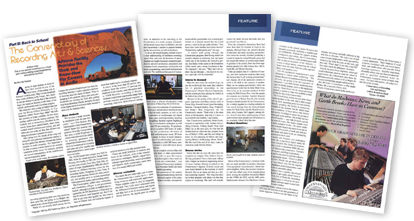Pro Audio Review - October, 1997
by Dee McVicker

"You name the pro audio topic, and it seems the Conservatory has a course for it - most being hands-on with real-world applications. 'When students come in, they're magazine eduacated. They really don't understand what the difference is between anaog and digital, and they have a lot of misconceptions,' says Brock Roberts, the digital guru on campus who, in addition to his teaching at the the Conservatory, is a music systems consultant. All the more reason it is Robert's job and the Conservatory's mission to prepare students for the here and how, as well as the future."
"To do so, the school requires students to have a clear understanding of multitrack recording, signal flow, and even the business of music. Students are taught broadcast commercial production and post-production, proprietary and computer-based sequencing, automation and music programming, and sound reinforcemen methods. The multifaceted program of instruction also covers the rudiments of synchronization techniques and introduces students to non-linear digital audio systems, as well as the proper operation of oscilloscopes and digital multimeters, plus concert promotion, licensing, and copyrighting. Students explore Digidesign Pro Tools 4.0 workstation techniques as well as tape and CD pre-mastering."
Interns in Demand
Students have to complete an internship with a studio, record label, or other audio-related organization in order to pass the course. Period. 'I think in that respect it does weed out students who are not committed,' says Meagan Mead, a recent Conservatory graduate who is interning at Porcupine Studio and plans to go on to live sound engineering."
When the time comes for students to go out into the world to ply their trade, they submit a list of potential internships to the Conservatory's Student Services Department, and the school gets busy placing the student in the field of his or her choice."
"Because of the quality of the school's program, big-name recording studios such as Ocean Way, Emerald Sound, Quad Recording, Motown, Universal Studios, Sony, Todd A/O, and King's Way frequently ask for Conservatory interns. 'That really is the main thrust of the program, and why it's been so successful for our students,' says [Conservatory Administrator], Kirt Hamm."
One Conservatory graduate, Noah Evens, wanted to apprentice with Adrian Belew, (King Crimson, Talking Heads, Nine Inch Nails). So, as the story goes, he went into the Student Services office one day, plopped down one of Belew's CDs, and the next thing he knew, he was interning for Belew's forthcoming album 'Here.' But that wasn't the end of his story. Later, he went on to work full time with Belew."
Success Stories
Stories like this are more the norm than the exception on campus. Take Andrew Garver. Having graduated from a four-year college with a degree in electrical engineering almost ten years before, Garver enrolled in the Conservatory's rigorous 22-week course and soon found himself on the doorstep of A&M Records, first as an intern and then as a full-time mastering engineer. 'The thing that drew me to their program over others was that they require an internship. The staff will actually contact the studio for you and make sure you get placed.'"